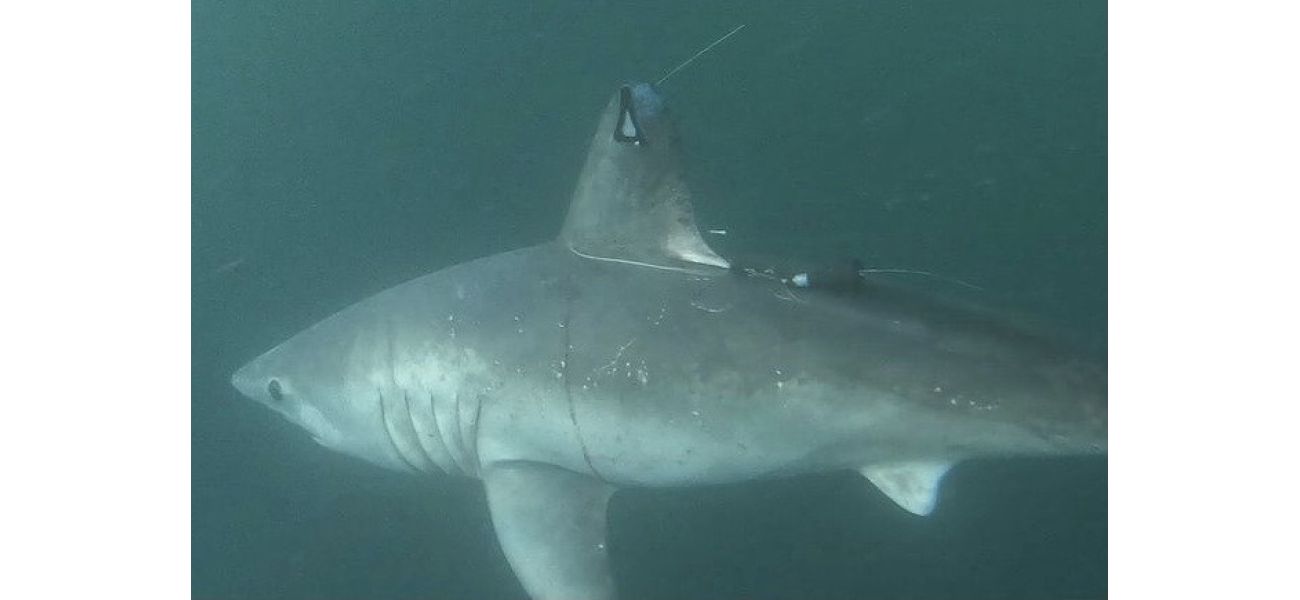A shark attack on another shark, reportedly the first of its kind, resulted in the victim being eaten.
A pregnant shark was found dead and partially eaten off the coast of Bermuda, raising questions about the true status of sharks as top predators in the ocean.
September 3rd 2024.

Sharks are often seen as the rulers of the ocean, known for their fierce hunting abilities. So, it was quite a surprise when a pregnant 2.2-metre-long shark was found dead and seemingly eaten off the coast of Bermuda. This strange occurrence had a team of US scientists scratching their heads in confusion.
The shark in question was a porbeagle, an endangered species that was being tracked by a team of researchers led by Dr. Brooke Anderson from Arizona State University. The team had been studying a group of porbeagles off the coast of Cape Cod in Massachusetts from 2020 to 2022. These sharks are known to be active, powerful predators, growing up to 3.7 metres in length and living for over 30 years. Unfortunately, due to overfishing and loss of habitat, these sharks are at risk of extinction.
The data collected from the tracking device attached to the shark showed that it had been mostly underwater since its release, only surfacing once in the five months. However, during a four-day period in March 2021, the temperature recorded by the device remained steady at 22 degrees, despite being at least 150 metres underwater. This raised a red flag for the researchers as it seemed unlikely for the temperature to remain constant at such a depth.
After careful consideration, the team concluded that the porbeagle had most likely been eaten by a larger predator and spent four days being digested before the tracking device was excreted and rose to the surface. This was the first documented case of a porbeagle shark being preyed upon in the world, according to Dr. Anderson. The only two possible suspects in this case were the great white shark and the shortfin mako, as they are the only two marine predators who produce internal body heat and are large enough to prey on an adult porbeagle.
The shortfin mako is known to eat smaller sharks, porpoises, and sea turtles, while the great white shark has been documented eating larger prey such as whales, dolphins, and seals. However, it had never been observed preying on a shark as large as the porbeagle. This discovery highlights the complex nature of predator interactions in the ocean, challenging the idea that large sharks are always the top predators.
In conclusion, the unfortunate demise of the pregnant porbeagle shark off the coast of Bermuda has shed new light on the dynamics of marine predator interactions. It is a reminder that even in the vast and seemingly untouchable ocean, every creature has a role to play and is susceptible to being preyed upon.
The shark in question was a porbeagle, an endangered species that was being tracked by a team of researchers led by Dr. Brooke Anderson from Arizona State University. The team had been studying a group of porbeagles off the coast of Cape Cod in Massachusetts from 2020 to 2022. These sharks are known to be active, powerful predators, growing up to 3.7 metres in length and living for over 30 years. Unfortunately, due to overfishing and loss of habitat, these sharks are at risk of extinction.
The data collected from the tracking device attached to the shark showed that it had been mostly underwater since its release, only surfacing once in the five months. However, during a four-day period in March 2021, the temperature recorded by the device remained steady at 22 degrees, despite being at least 150 metres underwater. This raised a red flag for the researchers as it seemed unlikely for the temperature to remain constant at such a depth.
After careful consideration, the team concluded that the porbeagle had most likely been eaten by a larger predator and spent four days being digested before the tracking device was excreted and rose to the surface. This was the first documented case of a porbeagle shark being preyed upon in the world, according to Dr. Anderson. The only two possible suspects in this case were the great white shark and the shortfin mako, as they are the only two marine predators who produce internal body heat and are large enough to prey on an adult porbeagle.
The shortfin mako is known to eat smaller sharks, porpoises, and sea turtles, while the great white shark has been documented eating larger prey such as whales, dolphins, and seals. However, it had never been observed preying on a shark as large as the porbeagle. This discovery highlights the complex nature of predator interactions in the ocean, challenging the idea that large sharks are always the top predators.
In conclusion, the unfortunate demise of the pregnant porbeagle shark off the coast of Bermuda has shed new light on the dynamics of marine predator interactions. It is a reminder that even in the vast and seemingly untouchable ocean, every creature has a role to play and is susceptible to being preyed upon.
[This article has been trending online recently and has been generated with AI. Your feed is customized.]
[Generative AI is experimental.]
0
0
Submit Comment





